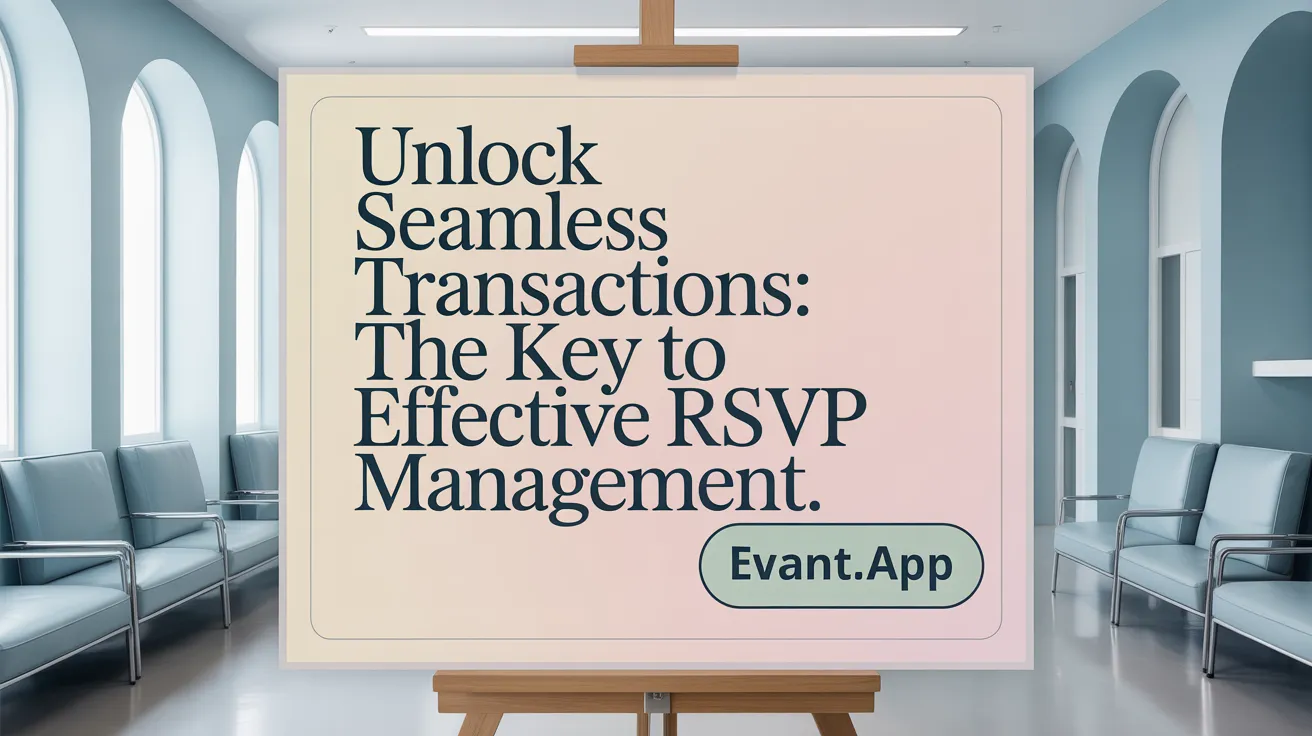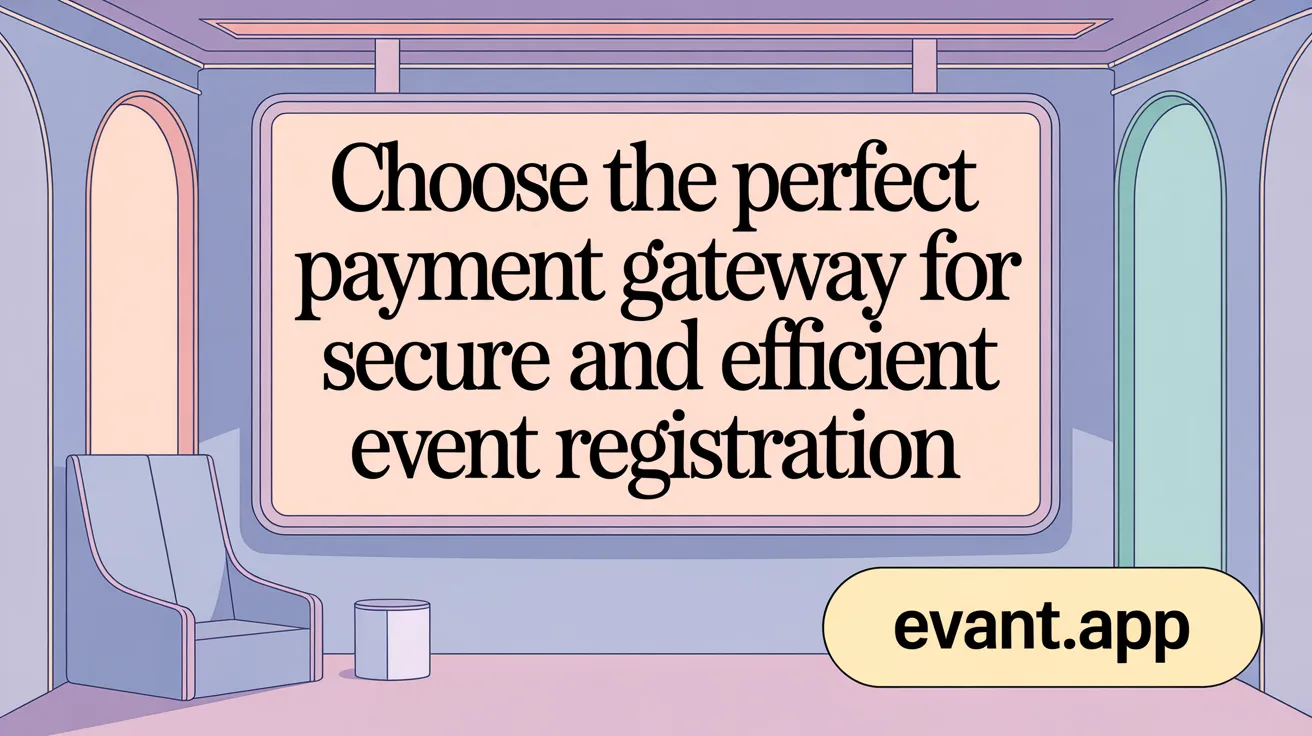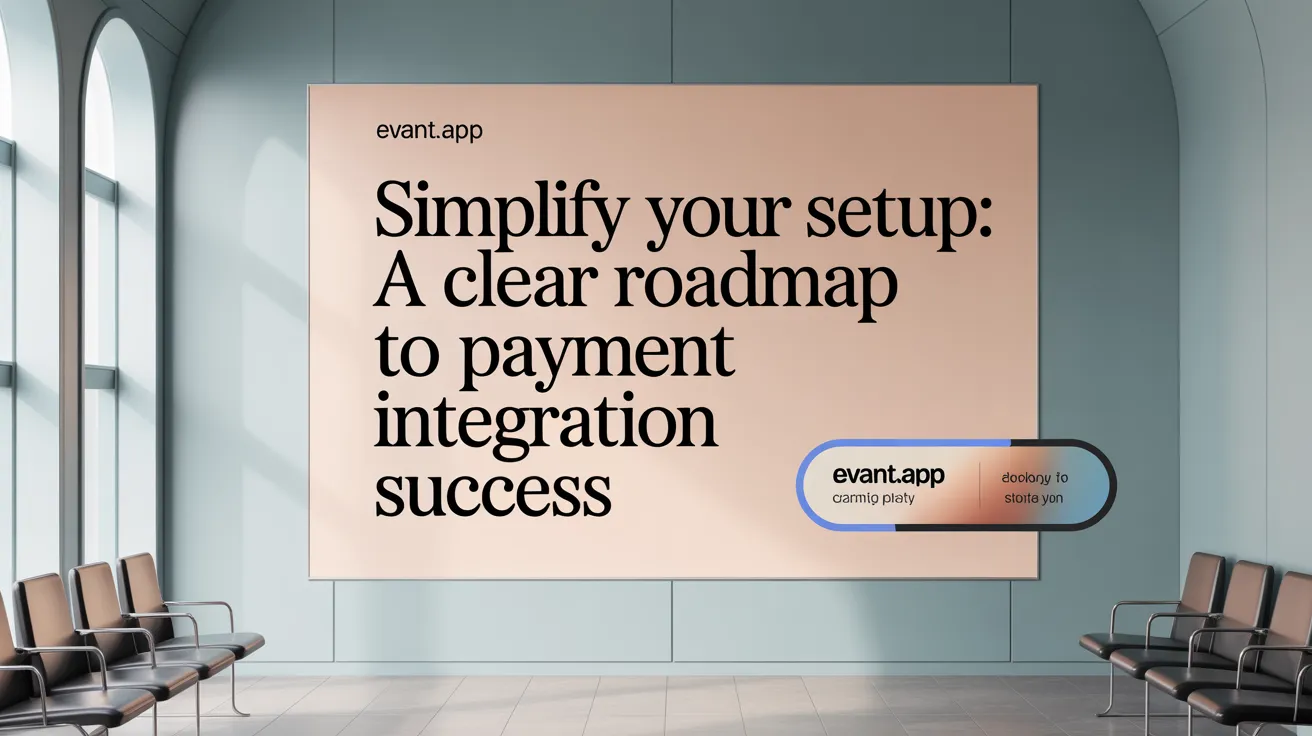Seamless Payment Integration with RSVP Platforms: A Step-by-Step Guide

Unlocking Seamless Payments in RSVP Systems
Integrating payment functionalities into RSVP platforms is crucial for event organizers seeking to streamline registration, enhance attendee experience, and ensure secure financial transactions. This step-by-step guide explores best practices, technical implementations, and key considerations to help you design a seamless payment integration tailored for event registration platforms. From selecting suitable payment gateways to implementing robust security measures, we'll cover everything you need to make your RSVP process both efficient and reliable.
Understanding Payment Integration in RSVP Platforms

What is payment integration software and what role does it play?
Payment integration software acts as a bridge that connects event platforms with various payment gateways, facilitating smooth data exchanges and transaction authorization. It enables RSVP and event management platforms to support secure, quick, and flexible payment processing directly during registration. This software helps organizers manage transactions efficiently and ensures a seamless experience for attendees.
Why is payment integration important for RSVP and event platforms?
Including payment capabilities within RSVP platforms simplifies event registration, allowing attendees to pay easily at the moment of RSVP. This integration accelerates registration processes, enhances user satisfaction, and provides organizers with instant access to revenue data. Additionally, it supports features like automated refunds, detailed sales reports, and real-time payment tracking, all of which contribute to smoother event management.
What types of payment gateways and methods are supported?
Most payment platforms support a broad range of payment options:
- Credit and Debit Cards: The most common form of online payment.
- Digital Wallets: Options like Apple Pay, Google Pay, and other e-wallet services.
- Bank Transfers: Direct transfers from attendees’ bank accounts.
- Buy Now, Pay Later (BNPL) Schemes: Flexible payment plans for attendees.
- UPI Payments: Popular in regions like India for instant bank transfers.
Payment gateways themselves can be classified into three types:
| Gateway Type | Control Level | Suitable For | Key Features |
|---|---|---|---|
| Hosted Gateways | High (full control outside) | Beginners and small setups | Easy to implement; less compliance burden. |
| Self-Hosted Gateways | Moderate to high | Large organizations needing control | More control over transactions; requires maintenance. |
| API-Based Gateways | Custom integration | Developers and custom setups | Highly flexible; complex integration process. |
Support for multiple methods ensures broad accessibility and improves attendee convenience. The choice depends on factors like desired control, security features, and platform compatibility.
Selecting the Right Payment Gateway for Your RSVP Platform

When choosing a payment gateway for an RSVP system, it’s important to consider several factors that ensure a smooth, secure, and efficient payment process.
Popular Payment Gateway Providers include well-known companies such as Stripe, PayPal, Klarna, Apple Pay, Google Pay, Block (Square Online), Helcim, and Authorize.Net. Each offers unique features suitable for event registration platforms:
- Stripe and PayPal are widely used for their ease of integration and extensive payment options.
- Klarna and Apple Pay offer flexible financing and contactless payment features.
- Google Pay simplifies mobile transactions, while Block (Square) provides comprehensive point-of-sale solutions.
Criteria for Selecting a Payment Gateway involve examining their compatibility with your platform, ensuring robust security measures, and evaluating transaction fees:
- Compatibility includes supporting your platform’s technical stack (e.g., WordPress, Shopify, custom APIs).
- Security should adhere to PCI-DSS standards, employ SSL encryption, and support fraud detection.
- Fees vary; compare transaction costs, chargeback policies, and monthly charges.
Types of Payment Gateways include:
- Hosted gateways: redirect users to the provider’s secure pages.
- Self-hosted gateways: integrate payment forms directly into your site.
- API-based gateways: offer customizable and flexible connections, ideal for tailored RSVP portals.
Choosing the right gateway depends on your event’s needs, expected transaction volume, and desired control over the user experience.
Best Practices for Seamless Payment Integration involve ensuring PCI compliance, supporting multiple payment methods like cards, wallets, and contactless options, and providing clear instructions during payment processes. Optimize checkout pages for mobile use, include real-time payment status updates, and implement mechanisms for refunds and transaction reconciliation.
Maintaining compliance with security standards, local tax laws, and data privacy regulations is crucial. Moving forward, focus on scalable solutions by building secure APIs and automating payments monitoring to support growth across multiple markets.
Step-by-Step Guide to Integrating Payment Functionalities into RSVP Platforms

What are the step-by-step guidelines for integrating payment functionalities into RSVP platforms?
Integrating payment options into RSVP systems involves a series of structured steps to ensure a smooth and secure process for attendees.
First, select a payment gateway compatible with your platform. Popular options like Stripe, PayPal, Klarna, and Apple Pay are widely used due to their reliable APIs and security features. Consider your event's needs, including accepted payment methods and transaction fees.
Next, register with your chosen payment provider. This registration provides you with essential credentials such as API keys or tokens, which are used to authenticate transactions securely.
Once registered, configure the payment settings within your RSVP platform. Many platforms offer dedicated plugins or extensions—like WordPress plugins or Shopify integrations—that simplify this process. For custom setups, API integration enables direct communication between your platform and the payment gateway.
Ensuring transaction security is crucial. Implement SSL certificates to encrypt data transmitted during payment, and utilize tokenization to protect sensitive card information. Employ fraud prevention tools such as Google Captcha, IP restrictions, and transaction monitoring to safeguard your event.
After setting up the basic payment model, incorporate additional features like ticket tier management, donations, or promo codes as needed. These features should be integrated cleanly within your RSVP flow.
Thorough testing is the next critical step. Simulate transactions to verify that payments are processed correctly, confirmations are received, and refund procedures work smoothly. Testing helps identify and fix issues before your event.
Finally, enable real-time notifications for successful payments and generate detailed revenue reports. This ensures transparent finance management and improves attendee experience.
Following these steps will help you develop a robust, secure, and user-friendly payment-enabled RSVP process, increasing event registration and streamlining post-event accounting.
Technical Implementation of Payment Solutions in RSVP Systems
What are the technical steps involved in implementing payment solutions within RSVP systems?
Integrating payment solutions into RSVP platforms involves a series of well-planned technical steps to ensure smooth, secure, and efficient transaction processing.
The process begins with selecting a suitable payment gateway provider such as Stripe, PayPal, or others and obtaining the necessary API credentials. These credentials facilitate authorized interaction between the RSVP platform and the payment gateway.
Next, developers embed the payment SDKs or APIs into the existing system. This process often requires custom development, especially if the platform is built using technologies like ASP.NET, PHP, or Java, along with databases such as SQL Server. Secure front-end payment forms, constructed with HTML5 and JavaScript libraries like jQuery, are essential for collecting user payment data safely, ensuring data encryption from the point of entry.
On the server side, the system must validate payment details, handle user authorization, and communicate securely with the payment gateway for transaction approval and settlement. This involves implementing backend scripts that send transaction requests and process responses, managing authorization levels, and handling success or failure outcomes.
Additionally, setting up webhook notifications is crucial. Webhooks enable real-time updates by receiving instant notifications from the payment provider once a transaction is confirmed or failed. These updates can automatically trigger changes to RSVP records, such as confirming attendance or issuing refunds.
To maintain a streamlined experience, the payment process must be integrated with the platform’s CRM and data management systems. This integration ensures accurate recording of transactions, attendee data, and reporting metrics, all while adhering to PCI-DSS and data security standards.
Overall, these technical steps — from obtaining credentials, integrating SDKs, creating secure payment forms, processing server-side transactions, setting up webhooks, and connecting with CRM systems — establish a reliable and safe payment environment within RSVP solutions, enhancing user trust and operational efficiency.
Establishing Secure and Efficient Payment Gateways for Event Registration
To set up secure and efficient payment gateways for event registration in RSVP platforms, start by selecting reputable providers such as Stripe, PayPal, or specialized systems like Eventsforce. These providers support a wide range of payment methods, including credit cards, digital wallets, and bank transfers, ensuring flexibility for attendees.
Integration is typically achieved through APIs, plugins, or custom-coded solutions. It's important to follow the provider’s instructions carefully during implementation and to utilize sandbox environments for thorough testing without risking live transactions. This testing phase allows confirmation that all payment flows are working smoothly.
Security is crucial in payment processing. Implement robust standards such as PCI-DSS compliance, which ensures handling of cardholder data meets strict security protocols. Employ SSL/TLS encryption to protect data transmitted during transactions. Tokenization should also be used, replacing sensitive payment information with secure tokens, minimizing risk if data breaches occur.
Enhancing efficiency further involves configuring transaction rules, such as setting fixed booking fees, supporting multiple currencies, and enabling fraud detection systems. Real-time transaction monitoring helps identify suspicious activities promptly, reducing potential fraud and chargebacks.
Automation plays a vital role in maintaining seamless operations. Automate confirmation emails to attendees upon successful registration and payments. Utilize reporting tools provided by the gateway or integrated platforms to monitor transaction statuses, generate financial reports, and manage refunds efficiently.
Overall, choosing the right payment gateway provider, adhering to security best practices, and implementing automation and real-time monitoring create a reliable and secure environment for event registration payments. This comprehensive setup improves attendee experience, reduces manual workload, and ensures trust in your event management process.
Overcoming Common Challenges in Payment Integration for RSVP Platforms
Compatibility issues and maintenance
Integrating payment systems into RSVP platforms often involves navigating compatibility challenges across different devices, browsers, and operating systems. Ensuring that payment gateways work smoothly with various platform configurations requires ongoing maintenance and updates. Regular testing and choosing adaptable software solutions help prevent disruptions.
Managing transaction fees and processing speed
Transaction fees can eat into event revenue, making it important to select payment providers with competitive rates. Additionally, slow processing speeds can deter attendees at checkout. Optimizing integrations to ensure quick, seamless payment flows enhances user satisfaction and reduces potential drop-offs.
Enhancing user experience and customer support
A user-friendly payment process is crucial. Clear instructions, minimal steps, and mobile-friendly forms improve conversion rates. Prompt, reliable customer support addresses payment issues swiftly, building trust and encouraging repeat attendance.
Compliance and security risks
Payment data must be protected to prevent breaches and fraud. Compliance with standards like PCI-DSS, encryption protocols, and regular security audits mitigate risks. Ensuring transparency about data handling enhances user confidence and safeguards the platform.
| Challenge | Solutions | Additional Details |
|---|---|---|
| Compatibility & Maintenance | Regular testing, adaptable software | Ensures smooth functioning across devices |
| Transaction fees & Speed | Choose cost-effective, fast processors | Improves user experience and revenue |
| User Experience & Support | Intuitive design, prompt support | Boosts customer satisfaction |
| Compliance & Security | PCI-DSS, encryption, audits | Protects user data and trust |
Leveraging Emerging Trends to Enhance RSVP Payment Systems

How are digital wallets and BNPL options transforming RSVP payment systems?
Digital wallets like Apple Pay and Google Pay have made it simpler for attendees to pay seamlessly through their smartphones, reducing friction during registration. These wallets also support various payment methods, including credit/debit cards and bank transfers, offering flexibility.
Buy Now, Pay Later (BNPL) schemes are gaining popularity among event organizers and participants alike. BNPL allows attendees to split payments into manageable installments, increasing accessibility and encouraging higher registration rates.
What is the role of embedded and invisible payments in RSVP solutions?
Embedded and invisible payments aim to streamline the payment experience by integrating payment options directly into the event page or app. Attendees can complete transactions without redirecting to external sites, making the process quicker and more user-friendly.
This trend enhances user experience and can boost conversions by minimizing steps and distractions during registration.
How do AI and machine learning help in fraud detection?
AI-powered fraud detection models analyze transaction patterns in real-time to identify suspicious activity. These systems adapt continuously, improving accuracy over time.
For RSVP systems, this reduces the risk of fraudulent registrations and unauthorized transactions, ensuring secure payments for organizers and genuine attendees.
What is the significance of open banking APIs and data analytics?
Open banking APIs enable secure data sharing between financial institutions and RSVP platforms. This access helps optimize payment processing and offers personalized payment options based on user financial data.
Data analytics further empower organizers by providing insights into payment behaviors, preferences, and trends. This information guides marketing strategies and enhances future event planning.
| Trend | Benefits | Implementation Examples |
|---|---|---|
| Digital Wallets & BNPL | Faster checkout, flexible payments | Mobile-enabled registration, installment options |
| Embedded & Invisible Payments | Seamless user experience | In-app registration, one-click pay processes |
| AI & Machine Learning | Improved security and fraud prevention | Real-time fraud alerts, adaptive risk scoring |
| Open Banking & Data Analytics | Personalization and better decision-making | Custom payment options, attendee insights |
As RSVP payment systems evolve with technology, organizers can expect smoother transactions, increased attendee satisfaction, and more insightful data to refine their event strategies.
Optimizing the RSVP Payment Workflow for Better User Experience
How to ensure clear payment instructions and effective UI design
A seamless RSVP payment process begins with clear instructions and straightforward user interface design. Use concise language, visual cues, and step-by-step guidance to help users understand exactly what to do. Prominent placement of payment details, along with easy-to-follow forms, reduces confusion and increases completion rates.
Offering multiple payment options
Catering to diverse preferences, providing several payment methods such as credit and debit cards, digital wallets like Apple Pay and Google Pay, bank transfers, and Buy Now Pay Later schemes broadens your event's accessibility. This flexibility encourages more users to complete their registration, regardless of their preferred payment choice.
Implementing real-time payment status updates and notifications
Real-time transaction tracking keeps attendees informed about their payment status. Automated notifications via email or SMS confirm successful payments, alert users of errors, and provide essential details. Incorporating these updates enhances trust and minimizes follow-up inquiries.
Managing refunds and post-event reconciliation
Offering a straightforward process for refunds improves attendee satisfaction. Post-event, ensure that refunds, adjustments, and reconciliation procedures are transparent and prompt. Automated systems can simplify this, reducing manual effort and maintaining positive relationships even when issues arise.
Incorporating these strategies results in a smooth, transparent, and user-friendly RSVP payment experience. A well-optimized workflow not only increases registration completion but also builds attendee trust, encouraging future participation.
Automating Payment Management and Post-Integration Monitoring
How do you monitor transaction data after integrating payment systems?
After integrating payment gateways, continuous monitoring of transaction data becomes essential. This involves tracking transaction success rates, failure reasons, and processing times. Many platforms employ dashboards that visualize real-time data, helping to spot unusual activity or potential issues.
Why are system updates and new feature adoption important?
Regular system updates are crucial to maintain security, improve performance, and leverage new functionalities offered by payment gateway providers. Staying current with updates ensures better compatibility, reduces vulnerabilities, and allows integration of features like new payment methods or fraud detection tools.
How can revenue reporting and analytics improve your payment processes?
Revenue reporting provides insights into sales trends and customer payment behaviors. Analytics tools can break down data by payment method, location, or customer segment, informing business decisions. Automating these reports saves time and helps identify areas for growth or optimization.
What measures are necessary to maintain compliance and security after launch?
Post-launch, adherence to PCI-DSS standards is vital for securing credit card data. Regular security audits, maintaining SSL certificates, encrypting sensitive data, and monitoring for fraud are essential practices. Additionally, staying informed about regulatory changes helps ensure ongoing compliance and protects customer information.
Incorporating these practices creates a reliable, secure, and efficient payment environment, crucial for the success of RSVP platforms and other online services.
Enhancing RSVP Platforms with Payment Integration: Tools and Best Practices

Utility of dedicated event management platforms like Gevme
Dedicated event management platforms such as Gevme offer comprehensive solutions to streamline RSVP processes and improve attendee engagement. These platforms provide customizable registration forms, automated messaging, and real-time tracking, all integrated with payment systems to facilitate seamless transactions.
Customizable registration forms and automated messaging
Using platforms like Gevme enables organizers to create tailored registration forms that capture specific attendee data. Automated emails for confirmations, reminders, and post-event follow-ups not only save time but also enhance the attendee experience. These features improve response rates and ensure clear communication.
Real-time tracking and data integration
Effective RSVP platforms incorporate real-time tracking tools that monitor registration numbers, check-ins, and no-shows. This data integration allows event organizers to adjust strategies promptly, optimize resources, and analyze performance after the event.
Boosting attendance and payment efficiency
Integrating reliable payment tools within RSVP systems simplifies fee collection, offering options like credit cards, digital wallets, and other methods. This not only accelerates payments but also broadens market reach, enabling in-person and mobile transactions. Optimizing these processes leads to higher attendance, reduced manual effort, and improved revenue management.
Tools for payment integration in RSVP platforms
Popular tools include Stripe, PayPal, and other gateway providers that support API integration with platforms like Gevme. These tools ensure secure, PCI-DSS compliant transactions, automate payment collection, and facilitate seamless synchronization with attendee data.
| Tool | Features | Payment Options Supported | Best Use Scenario |
|---|---|---|---|
| Stripe | Developer-friendly API, flexible customization | Credit/debit cards, digital wallets | Large-scale events needing customized payment flows |
| PayPal | Widely recognized, simple setup | PayPal balance, cards | Quick setup for small to medium events |
| Klarna | Buy Now, Pay Later options | BNPL schemes | Events with higher ticket prices or flexible payment plans |
| Apple Pay | Faster checkout via Apple ecosystem | Apple Pay-compatible devices | Mobile-focused events with Apple user base |
| Google Pay | Contactless payments, integration with Android devices | Android phones, cards | Tech-savvy audience, in-person NFC payments |
Choosing appropriate tools depends on event size, target audience, and payment preferences. Proper integration ensures secure, fast, and flexible payment experiences, boosting both registration and revenue.
Seamless Payment Integration: Your Path to Event Success
Integrating payment functionalities into RSVP platforms is a multifaceted process that demands careful planning, technical expertise, and adherence to security standards. By selecting the right payment gateways, following structured implementation steps, and leveraging modern technologies like AI-driven fraud detection and embedded payments, event organizers can ensure a smooth, secure, and efficient transaction process. Coupled with an optimized user experience and ongoing monitoring, these integrations empower events of all scales to maximize attendance and financial outcomes. Embracing these strategies transforms RSVP platforms into powerful tools that seamlessly combine registration with payment, ultimately contributing to the overall success and professionalism of your events.
References
- Payment Integration Software: Simplifying Transactions ...
- Your Ultimate Guide to Payment Gateway Integration for ...
- Event RSVP Services: How to Increase Your Response Rate
- Event Payment System | Collect Money for Events
- RSVP Communications Inc
- Stripe Integration
- How to Add an RSVP to Your WordPress Site in 2025
- 04 Super-Easy Ways to Integrate Your Events ...
- Event payment processing: What to look for
- Six common pitfalls of payments integration and how to ...
Related Blogs


How Community Churches Should Leverage SMS to Boost Engagement
Michael PedoeemStruggling with low church attendance? Discover how to leverage SMS to reach 98% of your congregation instantly and review the top 5 church communication platforms.


SMS for Churches: A Guide to Better Engagement
Michael PedoeemLearn how SMS for churches can boost engagement, improve communication, and streamline event management. Discover best practices for church texting today.
Ready to transform your community









